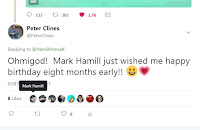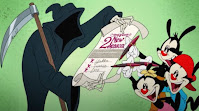There’s a recurring type of video or article or straight up ad that you’ve probably seen. They’re the ones that say something like “Three simple tricks to losing belly fat” or maybe “How I turned this pile of construction waste into raised vegetable beds in just four easy steps.” Or of course, “Four easy steps to get your novel written and published!”
And let’s be honest… we’ve probably all checked out at least one of these. Maybe even a few of them. And I don’t know about you, but for the vast majority of these “four easy steps” things there tends to be a few recurring issues…
F’r example…
First, they usually require lots of practice. Yeah, it’s easy to do this—on the nineteenth or twentieth try. All those first attempts are going to be messy and expensive and possibly painful, but by the twentieth I should be getting completely adequate results.
Second, they often require lots of other skills or equipment. Building miniature scenery is a snap once I’ve got an electric foam cutter, an X-Acto set, these eleven paints, four different drybrushes, and all these specialized raw materials. Making perfect carrot roses are no problem at all. Just get out your 1 3/4” mellonballer…
Third, as the previous two points implied, is they’re rarely simple. A lot of times each of these “easy steps” has four or five sub-steps, which means this is really a sixteen or twenty step “easy” process and the whole thing ends up sounding like that guy at Comic-Con who walks up the microphone and says “My question actually has six parts…”

Fourth and finally… they’re just usually not that effective. In the long run, most of these “four-or-five easy steps to accomplish something” methods just aren’t worth it. Yeah, there’s a chance I might learn a small trick, but in the end, all the time and effort (and maybe even money) spent trying to do something the easy way could’ve just been spent on learning… well, how to do it. If I really want to make good-looking miniature scenery, maybe I should just… y’know, learn how? Not try to figure out some trick that’ll let me skip the learning curve.
Also, I just now realized I’ve listed out four recurring issues, but those aren’t the four steps I was talking about. Please bear with me. It’s just a weird coincidence a better writer would’ve avoided.
Anyway…
“Skipping the learning curve” is something I’ve talked about before, and it ties back to a little maxim I came up with when I was still working in the film industry. It’s one of those things that immediately struck me just how true it was, and I could see it borne out in everyone I worked with and almost everything they did. And yes, I could see where i fit in it, too. I call it the Four Step rule. Whether we’re talking about a career or a hobby or almost any sort of endeavor, everybody goes through the same four stages.
1) Not knowing what I’m doing.
2) Thinking I know what I’m doing.
3) Realizing I don’t know what I’m doing.
4) Knowing what I’m doing.
Pretty simple and straightforward, yes? I can’t remember exactly how I stumbled onto this, but like I said… it just instantly made sense. I could see it with other people on movie sets, yeah, but also with the staff members for an online game I worked on for a while. I saw it in tabletop gaming (both the gaming and the artsy side of it). I’m currently experiencing it in photography. I’ve talked to friends in a bunch of different fields about this and they’ve all seen it, too.
Hopefully most of you can see it applies to writing, too. Personally, when I first sat down to write a story in third grade, every aspect of “writing” was a mystery to me. Character arcs, linear and narrative structure, dialogue descriptors—these terms meant nothing to me. I didn’t even know what I didn’t know.
Of course, once the words were typed out in front of me, it was clear I was a genius. I mean, look at them—they’re typed! Alas, many editors did not agree with my assessment of those pages, and I had a good sized stack of rejections before I had body hair. And that file folder of rejections got thicker and thicker for many years.
I think I was in college when I started to consider that maaaaaaybe every single editor I submitted to wasn’t the problem. Maybe my stories weren’t genius just because they were typed. Yeah, the ones I was writing at that point had a much more elaborate vocabulary than my old ones, but were they really any better than the ones I’d been writing at age eleven…?
I had dozens and dozens of rejections under my belt, but it turned out I still really didn’t know much about writing or storytelling. I’d spent eight or nine years ignoring advice and missing opportunities because I was convinced I was already great. And how could you improve on great?
Being able to acknowledge I still had a lot to learn was what let me finally improve. And improving was what let me get where I am today. Working with other professionals who treat me like a professional. Able to offer actual advice with experience backing it up. Even if some of that experience is, “wow, don’t screw up like I used to…”
Now, there’s an aspect of the four steps you’ve probably seen before. A sort of trap. I know I saw it in the film industry a lot. I fell into it for a while myself. I see it in writing, too.
There are folks out there who are pretty mediocre, sometimes even bad at their chosen career or hobby or what have you… but they’re convinced they’re fantastic. These people are stuck on step two—thinking they know what they’re doing—because they never had that slap down moment. They never bothered to improve because they never acknowledged a need to improve. They just stayed at those early, flawed levels.
Now, y’see, Timmy, we need that screw-up step. That early burst of overconfidence is important. It’s why we don’t give up on something the moment anything doesn’t turn out exactly like we planned. Well, most of us don’t.

But it’s even more important that we recognize it and move past it. That we admit how much we need to learn, accept some of that criticism of our work. And yeah, it’ll be frustrating as all hell and there’s a good chance I’ll find out I spent a lot of time on something that’s just going to go straight into a drawer or maybe the circular file. But if I’m open to learning from all that—to admitting I need to improve—that’ll ultimately move me through the whole process much faster.
We’re all going to fail at some point. And it’s okay to fail. The only problem is if I’m determined not to learn from it.
Next time– okay, look, I’ve got a minor procedure scheduled for next week that’s probably going to knock me out for a day or two, plus I’m about to start juggling edits on two different books. So next time might not be for another two weeks or so. I’ll probably still be getting the newsletter out, if you’re subscribed to that.
All that said… next time I’d like to tell you a fun and 100% true story about Harry Houdini and the lost city of Atlantis.
Until then, go write.








